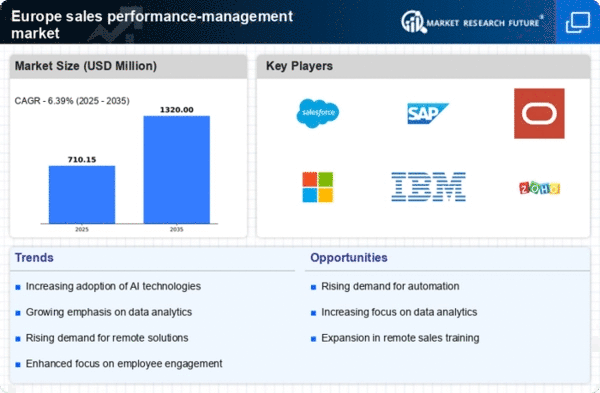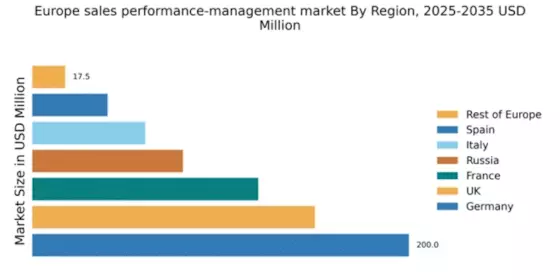Integration of AI and Analytics
The integration of artificial intelligence (AI) and advanced analytics into the sales performance-management market is transforming how organizations operate. AI-driven tools enable businesses to analyze vast amounts of data, providing insights that were previously unattainable. In Europe, the market for AI in sales is projected to grow at a CAGR of 30% from 2025 to 2030. This growth is driven by the need for enhanced decision-making capabilities and improved sales forecasting. Companies are increasingly leveraging predictive analytics to identify trends and optimize sales strategies. As a result, organizations that adopt these technologies are likely to experience improved sales performance and increased revenue. The sales performance-management market is thus witnessing a shift towards data-driven decision-making, which is essential for maintaining a competitive edge.
Shift Towards Remote Sales Teams
The sales performance-management market is experiencing a notable shift towards remote sales teams. This trend is driven by the increasing adoption of remote work practices across Europe. Organizations are recognizing the need to equip their sales teams with the tools and technologies necessary for effective remote collaboration. The market for remote sales enablement solutions is projected to grow by 20% annually, as companies seek to optimize their sales processes in a virtual environment. This shift presents both challenges and opportunities for the sales performance-management market. While remote teams may face difficulties in maintaining engagement, the right tools can enhance productivity and performance, ultimately leading to improved sales outcomes.
Growing Demand for Performance Metrics
The demand for performance metrics in the sales performance-management market is on the rise. Organizations are increasingly seeking to measure and analyze sales performance to drive improvement. In Europe, the market for sales analytics tools is expected to reach €5 billion by 2027, reflecting the growing importance of data-driven insights. Companies are utilizing key performance indicators (KPIs) to assess sales effectiveness and identify areas for enhancement. This trend is prompting the sales performance-management market to develop more sophisticated analytics solutions that provide real-time insights. By leveraging these metrics, organizations can make informed decisions, optimize their sales strategies, and ultimately boost their overall performance.
Emphasis on Customer-Centric Strategies
In the sales performance-management market, there is a growing emphasis on customer-centric strategies. Organizations are recognizing the importance of aligning their sales processes with customer needs and preferences. This shift is reflected in the increasing investment in customer relationship management (CRM) systems, which are expected to reach €30 billion in Europe by 2026. By focusing on customer satisfaction and engagement, companies can enhance their sales performance and build long-term relationships. The sales performance-management market is adapting to this trend by offering solutions that facilitate better customer interactions and feedback mechanisms. This customer-centric approach not only drives sales but also fosters brand loyalty, which is crucial in today's competitive landscape.
Regulatory Compliance and Data Security
The sales performance-management market is increasingly influenced by regulatory compliance and data security concerns. In Europe, stringent regulations such as the General Data Protection Regulation (GDPR) mandate that organizations handle customer data responsibly. This has led to a heightened focus on data security measures within the sales performance-management market. Companies are investing in secure platforms and technologies to ensure compliance and protect sensitive information. The market for data security solutions is expected to grow by 25% annually, reflecting the urgency of addressing these challenges. As organizations prioritize compliance, they are likely to enhance their sales performance by building trust with customers and minimizing the risk of data breaches.

















